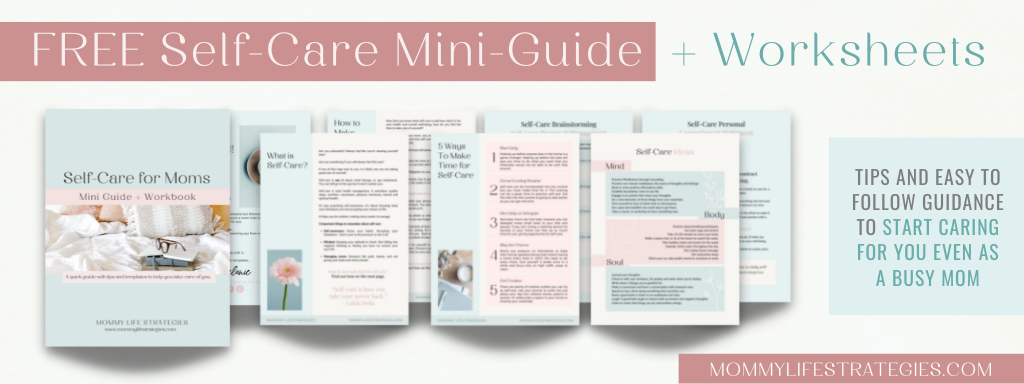
Perfectionism is tough to beat. As a mom, you try to balance it all and not drop the ball because if you did what would that make you?… A failure? A bad mom?
The pressure is always on when you’re a mom and it contributes to perfectionist behavior. Behaviors that can be detrimental to your mental and physical health.
Are you okay with being good enough?
“I’m going to do my best and I accept that it won’t be perfect.”
If I don’t succeed, I will move on and try again”
“I accept failure as a way to grow”
Said no perfectionist – ever.
While being a perfectionist might be perceived as a good trait and you might even brag about it. Like in a job interview, you say that your weakness is perfectionism. Remember that?
Sorry to say, but it’s nothing to brag about.
Perfectionism is very limiting and has more control over you than you might be aware.
If you want to learn how to embrace less than perfect so you can finally make progress in life, keep reading.
I’ll share with you lots of great insights and ideas to fight perfectionism.
What does a perfectionist look like? Learn more about it and why it’s holding you back here… 8 Key Signs You Might Be a Perfectionist Mom.
Self-awareness practice is essential
Knowing yourself is your best defense against perfectionism. Why?
When you know yourself well, you can live more mindfully and with intention.
Much of a perfectionist’s mental energy goes towards that “perfect” outcome. Making mistakes is a big source of anxiety.
To build a strong awareness of yourself, devote time to self-reflect every day.
This is powerful and gives you the ability to make positive changes in your life, whatever they may be.
You will never be self-aware if you don’t self-reflect.
Carve out time every day to reflect, making sure that you are not disturbed during this time.
How much time do you need to self-reflect? Fortunately, you don’t need a lot of time. 10-15 minutes to start is effective.
You can take more time but it’s not about the length it’s about the quality of the time being spent on reflection.
Guided self-reflection can be helpful especially when you’re a busy mom. Prompts and journals can make daily reflection possible when you’ve got busy days.
Here’s a good starter question…
What happened today that made me feel anxious or insecure?
Think about what happened when you felt that way. What was the trigger? Was there anyone with you? Where were you? When did it happen?
All it takes is one question to get your gears going and gain insight into your triggers.
With consistent self-reflection, you will catch your triggers in the moment. This gives you the power to change them.
Embrace mistakes
There’s a good phrase I like to tell my son, “Mistakes help you learn and grow”. It’s true for anyone, young or old.
If you’re a perfectionist, embracing mistakes will be tough and you might even think it ridiculous to do so. It’s tough but not at all ridiculous.
When you’re a perfectionist mom, you carry a lot of shame and mistakes make you feel rotten. To prevent feeling this way again, you avoid certain tasks because making a mistake would be devastating.
Shame and avoidance, perpetuate perfectionism.
You can let go of the shame by embracing that mistakes are a normal part of life. It does not mean you’re a failure.
Shift your thinking by reminding yourself that it happens to everyone and that there’s an opportunity to be had.
If you start a task or project and it makes you anxious to the point you begin fixating on making a mistake, think about what you are going to learn.
View it as an opportunity, not a trap.
Transfer your focus from the mistake to the opportunity. Focusing on the opportunity will ensure you never miss out on one!
Don’t get hung up on the results, learn to enjoy the process.
Try a simple activity you’re not good at, and practice focusing on the process itself and not the end result.
Art is a good starting point. For example, draw something simple like a flower. It’s an activity that anyone can do but not too easy and finish without focusing too much on the end result.
It is all right to make mistakes; nothing is perfect because with perfection, we would not exist.
Stephen Hawking

Learn about growth mindset
The mind is a powerful thing. I believe that you are what you think.
What you think affects your beliefs and your behaviors.
As a perfectionist mom, it is essential you develop a growth mindset.
Just like you want to keep your body fit and healthy, the mind needs fitness too. A growth mindset is a part of your mental fitness routine.
Negative thinking can ruin motivation making your personal growth very difficult to achieve.
A growth mindset will open doors instead of closing them.
You’ll be able to ditch your all-or-nothing thinking and change it to one of opportunity.
You can start developing your growth mindset by being aware of negative self-talk. If you’re thinking you will never be good enough, you will struggle to make progress and succeed.
When you make a mistake or are faced with a challenge, what messages do you send yourself?
Are they encouraging? If not, shift your thinking. Instead of “I can’t do this” try “I will try and do my best”. Keep giving yourself a pep talk using positive messaging until you’ve developed the habit.
Give yourself recognition for positive action. Track your progress a reward yourself for your achievements even if you think they are too small.
Progress is still progress.
Set realistic goals
If you have big goals, no one should stop you from achieving them.
Setting realistic goals doesn’t mean they have to be small or not ambitious.
If you’re a perfectionist mom, you want to do it all and you want to see the results – like yesterday.
Why set realistic goals?
If you’ve been setting the bar sky-high for a long time, you’re likely struggling to find success.
The problem with perfectionism is that you feel if it isn’t big, it’s not significant. If it’s not significant enough, then you won’t succeed or make progress.
That is false.
Setting realistic goals, especially if you struggle with perfectionism, can help you succeed. It can help you stay focused and stick to your priorities. The more focused you are, the easier it is to achieve your goals.
I recommend starting with mini goals. These are the small wins that add up, boosting your confidence.
As you might have discovered already, perfectionism can take a toll on your mental health.

Practice self-compassion consistently
Do you practice self-compassion?
When recovering from perfectionism, practicing kindness towards oneself is not easy.
The habits you’ve developed as a perfectionist are not amenable to self-compassion.
There are ways to be kinder when you expect so much of yourself.
Give yourself permission to be good enough. Remind yourself that the perfect mother is a myth.
If you make a mistake or your house is messy or lost your patience with your kids, give yourself grace.
Avoid reading articles with titles like these…How to be a good mother or 10 things great moms do every day.
They might be inspiring and well-meaning, but they could have you doubting yourself.
Look for solutions that focus on a specific problem you’re having.
These are generalized articles that can trap you into comparing yourself to someone else’s standards.
Be mindful of negative influences
You’ve probably heard that you are who you surround yourself with. If you are surrounded by negative influences, it could make perfectionist habits harder to kick.
Toxic people, online groups or campaigns that trigger your insecurity and shame are all external influences to be aware of and avoid.
Careful with transformation stories too. They can be inspiring and give you a nudge in the right direction. But you should be aware that transformations are never easy.
If you are always looking at the polished result, you will forget there was a journey to get there. The transformation doesn’t end there either, it continues and so does the journey.
The key takeaway is to always be aware of those around you and determine if they bring out the best in you.
Know your fears
If you struggle with perfectionism, your actions are driven a lot by fear. Fear of judgment and shame are drivers of perfectionism.
If you want to stop letting it control your life, you’ve got to know what your fears are.
Identifying what your fears are isn’t easy but with a little bit of effort you can find out.
At the beginning of this post, I emphasize self-awareness how important it is and that it’s your best defense against perfectionism.
Journaling is an easy and accessible way to build your self-awareness. Use journaling as a tool to discover your fears, strengths, and desires. Take note daily of when and where you feel fear the strongest.
You might discover that your fears and anxiety happen at a particular place or time. Keep journaling and taking notes until you see a pattern.

Stay focused on what matters
Why focus on what matters?
When you preoccupy yourself with doing everything right, your focus goes in the wrong places.
Let’s say that what matters to you right now is spending more quality time with your kids and spouse.
With perfectionism, you can get distracted by things that don’t matter like how spotless your home looks.
You might let a couple of dishes in the sink lead you to scrub the entire kitchen. By the time you’re done, it’s almost time for bed and you’re too tired to read your kids a bedtime book.
Was scrubbing the entire kitchen necessary? Probably not.
Perfectionism is a bad habit that can make prioritizing your life difficult. When you feel the urge to go above and beyond, ask yourself if it’s a priority.
What if you don’t know exactly what your priorities are? When you’re a mom everything appears like a priority right?
Not everything is a priority, and you need to determine what is.
It’s not easy, I get it.
Use a priority matrix to narrow down what’s urgent and important to you. A priority matrix is divided into three or four parts that rank tasks/projects in order of importance.
I like the ABC method, it’s simple and can save you time.
These are examples, your priorities will be different of course.
ABC method
- A) Important and Urgent – ASAP
- B) Important (Not urgent) – Will Do
- C) Less important and not urgent – Nice to do
Anything that goes in the A category is things that you do before anything else. Doctor’s appointments, homework, family time, family meeting, taxes, bills, and deadlines at work, are some examples.
Category B is important but only after category A priorities have been met. These can be shopping, cleaning up your inbox, scheduling non-urgent appointments or events, etc.
Category C will be anything extra like TV, social media, decorating the home, etc.
If you’re struggling to stay focused, try the ABC method.
Be at peace with your flaws (and flaws in others)
Just like making mistakes is part of life, so is having flaws. Welcome to being human!
Don’t fear others seeing your imperfections.
You might miss out on the chance for a real connection. Flaws make you real and relatable – authentic.
When you’re authentic, you attract true connections instead of superficial ones.
This will be hard to do. You’ve been putting on a front for a long time.
Start small, use common everyday struggles moms face like dirty dishes, messy house, etc. If you got kids, you got messes, it’s real life. People connect with real life.
Be honest with yourself about your flaws. Acknowledge them and if you have to write them out on paper.
In the end, your ideal is not the ideal, it’s just your ideal. What you see as flaws might not be to someone else or what you think someone else sees as flaws.
Be careful how much power you give it. Accept them, improve on them but don’t let them hold you back.
Once you’ve accepted your flaws, no one can use them against you.
George R.R. Martin, A Game of Thrones
Breaking the self-limiting and self-sabotaging cycle of perfectionism is not easy, but you can overcome it.
The best place to start is by exercising self-awareness and showing yourself some kindness.
A perfect mom is a myth you’ve got to stop believing is true. Start believing you are good enough and that your flaws don’t make you a failure.
Silence your inner critic, embrace your imperfections and keep focusing on what matters.
What was your biggest takeaway from this post? Share it in the comments.

Magic To-Do: The Simplied Task Management Tool For Moms

Getting Fit: 11 Simple “No Excuses” Strategies for Busy Moms

11 Tips to Plan a Simple and Stress-Free Summer Break

To-Do List Habits to Break Before 2024

38 Easy and Fun Indoor Activities for Kids(Ages 2-16)



